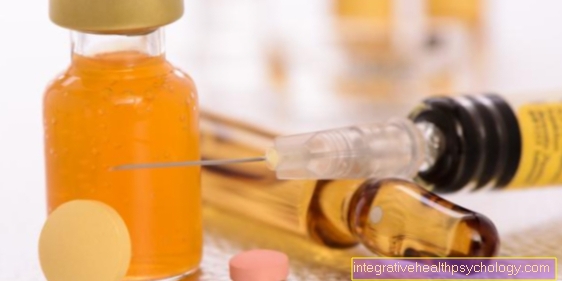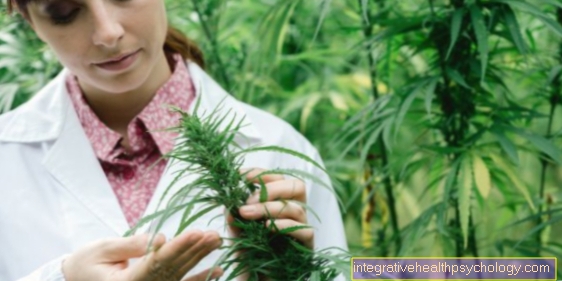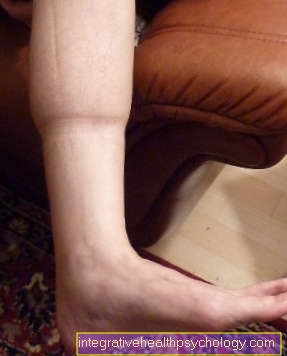Propolis
introduction
The term propolis is derived from the Greek and literally means “in front of” (pro) the “city” (polis). This name comes from the fact that propolis is found in heap at the entrance holes of beehives. It is a resin-like, sticky mass which, in addition to honey, is also produced by bees. Propolis is known to many people by numerous other terms such as bee glue, bee resin, advance or filling wax.
In the medical field, propolis can be found thanks to a variety of effects that promote the healing of various diseases. Important modes of action of propolis are antibacterial and antiviral effects. Furthermore, the propolis has a killing effect on fungi. So it is antifungal.

Bees also use these important modes of action to keep their colony healthy and to ensure survival. Important places in the beehive, such as the honeycomb in which the brood is located, are lined with propolis. This prevents bacteria and fungi as well as viruses from spreading to the population and thus ensures that many individuals can live together in a confined space.
The use in the health sector mainly focuses on the alternative and folk medicine sector. There are different dosage forms of propolis, for example ointments, creams, tinctures, lozenges and nasal sprays. The area of application extends from respiratory infections and inflammation of the mucous membranes to inflammation and injuries to the skin. There are also a variety of care products that contain propolis.
You might also be interested in this topic: Naturopathy
effect
Due to its composition, propolis has characteristic properties and effects. Not all of them are positive for humans. In addition to very helpful and health-promoting effects, propolis is also known to have side effects.
The following section deals in detail with the beneficial effects for humans:
1. Antibiotic / antibacterial effect: It has been proven that propolis has an antibacterial effect. The effect of propolis tinctures is particularly directed against gram-positive pathogens such as staphylococci. It could be shown in experiments that propolis inhibits the multiplication of pathogens. The antibacterial effect is not only directed against gram positive but also against gram negative bacteria. This antibacterial effect is mainly attributed to the flavonoids contained in propolis. Flavonoids are also found in many plants and vegetables. Further research showed that propolis can inhibit the attachment of bacteria to human cells. The antibacterial effectiveness is therefore significant, but it must be said that it is in no way as pronounced as the antibacterial effect of antibiotics. A serious infectious disease cannot be treated with propolis, because the antibacterial effect is simply too weak and many pathogens have long been resistant to such weak antibiotic effects.
Read more about this under Treatment with antibiotics.
2. Antiviral effect: In addition to the antibacterial effect of propolis, an antiviral effect is known. This means that the bee resin is effective against viruses and can damage and fight them. This effect is also called virostatic. It is known to be effective against the widespread herpes viruses and rhinoviruses. Herpes viruses trigger, among other things, inflammatory canker sores and blisters on the lip and mouth mucosa. Rhinoviruses cause respiratory infections, they are typical "rhinitis pathogens".
Read more about this under Medicines for viruses and blisters in the mouth
3. Antifungal effect: Propolis contains ingredients that have an antifungal effect. This means that propolis can inhibit the growth of fungi. The effect is primarily directed against the yeast Candida albicans and other skin fungi, so-called dermatophytes. Typically these fungi cause skin mycoses (fungal diseases of the skin). The antifungal effect, like the antibacterial and virostatic effects, is attributed to the flavonoids contained in propolis.
You might also be interested in: Skin fungus - The fungal infection of the skin
4. Antioxidant effect: The antioxidant effect of propolis was shown in animal experiments. The formation of reactive oxygen species was inhibited by propolis. Such reactive oxygen species are cell-damaging and arise in almost all metabolic processes in the body. They are also known as free radicals. UV radiation, nicotine, pollutants and environmental pollution also lead to the formation of free radicals in the body. These are involved in the development of various diseases such as cancer, arteriosclerosis and aging processes in the body. However, antioxidant substances such as propolis counteract these processes by inhibiting free radicals. However, a significant antioxidant effect of propolis in the human body has not been proven.
5. Immune-boosting effect: The immune-boosting effect of propolis has not been conclusively proven in humans. However, a positive effect on the thymus, an organ of the human immune system, is discussed. For example, propolis flavonoids are said to promote the activity of the thymus, especially in old age.
6. Wound healing effect: Propolis promotes the formation of granulations in the wound healing process. Granulation describes the formation of new connective tissue and is essential for good wound healing. The ingredients apigenin and luteolin, which also belong to the flavonoids, should be responsible for this.
Further information can be found here: wound healing
7. Cytotoxic effect: So far, this effect could only be shown in animal experiments. Propolis has a killing effect on tumor cells and inhibits their growth. However, this effect has not been proven in humans, so the use of propolis in cancer therapy does not make sense.
8. Other effects: Propolis also has a positive effect on oral and dental hygiene and prevents plaque formation there. A protective effect on pollen allergy is also discussed.
In conclusion, it should be said that the effect of propolis can vary depending on the composition of the product, so that different studies with sometimes differently composed products come to different results.
Side effects
In addition to many very positive properties, propolis also has a certain allergenic potential for humans, which is probably the most important and most significant side effect. It behaves like a contact allergen to humans, which can lead to contact dermatitis, especially in people with atopic predisposition. This is an allergic reaction of the skin, which is noticeable through reddening, swelling and flaking and which follows the contact of the skin with a certain substance. People with an allergic disposition or sensitive skin, for example in the context of neurodermatitis, are particularly affected, but also people with allergies to components of bee products such as honey and royal jelly. Therefore, these people should refrain from using propolis.
Read more about this: Allergy rash
Furthermore, the side effect profile in pregnant women is not sufficiently secured, so that they should also avoid propolis. The same goes for breastfeeding.
application
Due to its diverse modes of action, propolis is used in alternative medicine for various clinical pictures. It sees itself as a kind of supportive measure and cannot bring about a cure, so that conventional medical therapy should not be dispensed with.
Propolis is not used as a medicine, it is found in cosmetics and homeopathic compositions. Since the composition can vary considerably from manufacturer to manufacturer, no precise statement can be made about the dosages and compositions of the products. Creams, ointments and tinctures in particular are used to promote wound healing. However, they should not be applied to open wounds.
Typical areas of application are slight irritation of the skin, small abrasions or cracks or medical foot care. In the case of allergic eczema or a tendency to allergic reactions, especially of the skin, ointments and creams containing propolis should not be used. Propolis is also given to the care of mucous membranes, for example in the form of mouthwashes or lozenges. Typical reasons for supportive care with propolis are canker sores, inflammation of the mucous membranes in the mouth and smoking, but also medical dental care. Here the antimicrobial and wound healing effects of propolis are used.
Another very large area of application for propolis preparations is in personal care products. This also includes ointments, creams and tinctures. Shower gels, shampoos and body lotions with propolis can be found in cosmetic series. These are characterized by the characteristic, fragrant fragrance. Propolis ointments are also used to massage the painful areas of rheumatic diseases. Nasal sprays are another form of administration. They are also used like oral solutions and lozenges to support the healing of minor respiratory infections. The internal use of propolis in the form of capsules and homeopathic globules is based on immune-boosting and antioxidant effects, which, however, could not be proven in humans.
tincture
Propolis tinctures are often used in homeopathy. They are usually offered as drops that can be swallowed. Mainly, it is expected to have an immune-boosting effect, for example in the context of colds. Since there are no standardized indications for use with homeopathic medicines, this varies from manufacturer to manufacturer. Tinctures can still be used as nasal sprays or in the form of mouthwash to rinse the mouth and upper throat. The latter are used, for example, for mild inflammation of the oral and pharyngeal mucosa and to improve oral and dental hygiene.
You might also be interested in: Homeopathic medicines
Cream / ointment
There are many different creams and ointments that contain propolis in different compositions. They are offered by many manufacturers and are available without a prescription, as they are not drugs. Such creams and ointments are primarily used for body care and skin care. There are, for example, creams and ointments that are applied to light skin wounds and eczema to promote wound healing. Another area of application for creams containing propolis is medical foot care. Furthermore, ointments and creams can be used for cold sores and canker sores.
Caution is advised with an allergic predisposition or very sensitive skin, for example in the context of neurodermatitis. In these cases, propolis-containing creams and ointments should be avoided.
Capsules
Capsules containing propolis are mostly sold as dietary supplements and, like other products containing propolis, are available from various manufacturers. Reference is made in particular to an antioxidant effect and a strengthening of the immune system. However, these effects have not been proven in humans.
You might also be interested in: Which home remedies strengthen the immune system?
Other areas of application such as depressive moods and asthma are sometimes declared by the manufacturer, but are definitely not recommended, as these are diseases that require treatment. Capsules containing propolis cannot help in such cases and only delay adequate therapy.





























